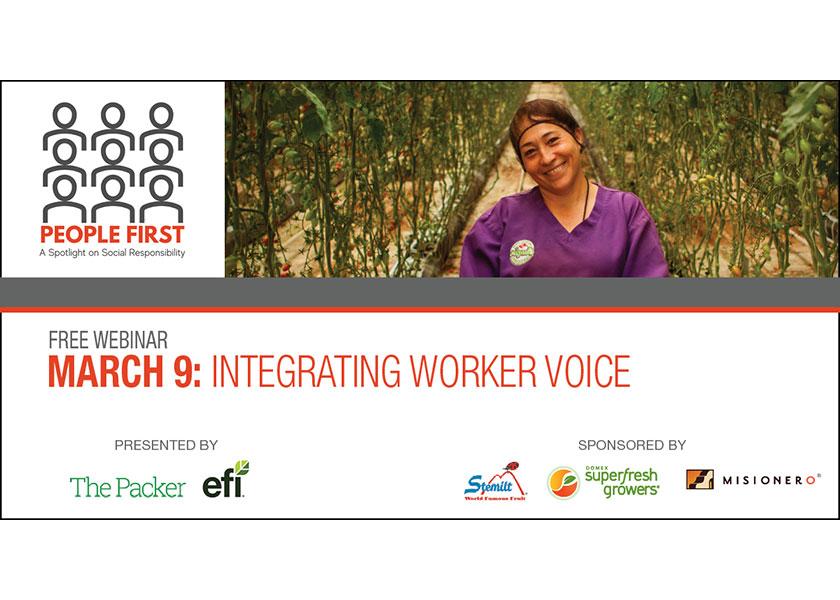Integrating worker voice in ag operations key to success, panelists

Integrating worker voices into agricultural operations can improve efficiency, contribute to better employee retention, discover hidden problems and create a more cohesive culture, panelists at the March 9 Farm Journal web seminar on social responsibility topics for the Equitable Food Initiative. The hour-long session was moderated by The Packer’s editor Tom Karst and featured panelists Gretta Siebentritt, director of workforce development for the EFI and Pamela Aceves, global human resources director for NatureSweet.
In the hour-long session, the panelists reviewed provisions of the Ethical Charter on Responsible Labor Practices, a document that was adopted by the Produce Marketing Association and the United Fresh Produce Association and scores of produce companies have endorsed.
The document stresses the value of positive relationships between the employer and the employee.
“We operate in a spirit of cooperation, learning and transparency with our workers, trading partners and other stakeholders,” the charter says.
In addition, Siebentritt said EFI was created about 10 years ago, with a multi-stakeholder board creating a certification program and standards in labor conditions, social responsibility, food safety, and responsible pest management.
Experience shows that collaboration among managers, supervisors, and workers creates business performance benefits within the company, she said.
Related: Communications toolkit provides messaging for #AlwaysEssential Workers
For example, she said EFI’s workforce development program is an adult education program that starts with formation of a labor management team. That team receives comprehensive training in communication, teamwork, problem solving and more.
The leadership teams are composed of men and women of different backgrounds and doing different jobs within the company.
“They represent all areas and demographics in the company, and the importance of that is that those diverse vantage points and diverse expertise and knowledge that comes together around that table means that there are channels of communication and engagement that you normally wouldn’t see,” Siebentritt said. “If you’re in an office, you don’t see always what someone might observe who’s working in a greenhouse or working in a field, so it provides tremendous advantages to bring that expertise to the table and create also those channels for communication.
Aceves said NatureSweet’s experience with the EFI model is that it promotes a better work environment and partnership of different sectors of the business.
“Everyone has something to say, and it is important for us to listen to them,” she said.
Related:Long-term strategies for social responsibility — Podcast
Leadership teams can look at problems and determine which solutions will work and which won’t, she said.
Integrating workers’ voice into ergonomic and workflow issues can improve productivity for the company and compensation for workers, Aceves said. “We have implemented lots of different ideas, and the (workers) are the ones who are telling us if this is working or not.”
Siebentritt said leadership teams at EFI-certified companies have meetings, and minutes from those meetings are posted to communicate the issues talked about. Those topics include problems like discrimination, bullying, harassment, along with continuous improvement in operational areas such as food safety, social responsibility and more.
Leadership teams also have been helpful in helping to deal with the COVID-19 pandemic and keeping employees safe, she said.
“We heard back from many growers from Mexico, the U.S. and Canada, telling us that if hadn’t been for those leadership teams, and channels of communication and engagement already working in the company, they wouldn’t have been able to push out that kind of information and take measures to protect the workers as quickly as they did.”
Related:
Views differ on necessity of third party certifications
Social responsibility programs can pay dividends in better labor relations
Industry gives favorable self-score on social responsibility, but point to barriers







